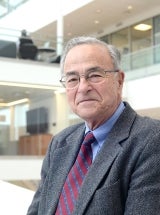Penn Vet’s Gustavo D. Aguirre Wins the Sanford and Susan Greenberg Prize for Ending Blindness

Faculty In This Story
Gustavo D. Aguirre, VMD, PhD, professor of Medical Genetics and Ophthalmology at the School of Veterinary Medicine at the University of Pennsylvania is the recipient of the Sanford and Susan Greenberg End Blindness Outstanding Achievement Prize which distinguishes scientists for their groundbreaking medical contributions to eradicate blindness. Announced during the live-streamed End Blindness 2020 ceremony on December 14th, Aguirre was selected for his “uniquely valuable research having the greatest impact toward advancing restoration of vision in human patients.” He is among 13 scientists sharing the $3 million award, and is the co-recipient of the Outstanding Achievement Prize with the Perelman School of Medicine’s Jean Bennett and Albert Maguire and University of Florida’s William Hauswirth.
Aguirre’s internationally renowned research, generated over the course of 40+ years, has investigated the genetic basis of a variety of inherited vision disorders, including Leber’s congenital amaurosis, Best disease, achromatopsia and retinitis pigmentosa. His seminal work on novel gene therapy approaches to treatment, which deliver to the eye a functional copy of a gene that is otherwise defective, has restored vision in animal models of X-linked retinitis pigmentosa and Leber’s congential amaurosis. The therapy for a form of Leber’s congenital amaurosis caused by mutations in the RPE65 gene is now commercialized after successful completion of human clinical trials.
“Dr. Aguirre espouses the highest standards of academic rigor, delivering world-class translational research in his field,” said Oliver A. Garden, Henry and Corinne R. Bower Professor of Medicine and chairman of the Department of Clinical Sciences and Advanced Medicine. “His scientific career is extraordinary and he epitomizes the excellence and impact that we all strive to achieve here at Penn’s School of Veterinary Medicine. We’re thrilled that the governing council and scientific advisory board of End Blindness 2020 has recognized Dr. Aguirre’s remarkable contributions.”
Aguirre is the 2019 recipient of the Inventor of the Year Award from the Penn Center for Innovation for his work in developing novel therapies for the treatment of inherited retinal disorders. In 2017, he was awarded the Association for Research in Vision and Ophthalmology’s Proctor Medal for his unique retinal gene therapy studies that used canine models of retinal degeneration to provide basic information about their counterpart human diseases and develop vision saving therapies. Aguirre is also the recipient of the 2016 Louis Braille Award for innovative research and treatment of inherited blinding diseases. Aguirre, a board-certified Diplomate of the American College of Veterinary Ophthalmologists, earned his VMD and PhD from the University of Pennsylvania. He is a member of the National Academy of Medicine and a Fellow of the American Association for the Advancement of Science, the Association for Research in Vision and Ophthalmology, and of the College of Physicians of Philadelphia.
“The goal of my work is to identify the genetic causes of blindness and to hopefully cure blindness through gene therapies and other approaches,” said Aguirre. “It is a tremendous honor to be awarded the Sanford and Susan Greenberg Prize. I want to thank the Greenbergs, the prize’s governing council and advisory board, as well as my peers and colleagues, who share my passion and commitment to improving the lives of people with vision impairments.”
The Sanford and Susan Greenberg Prize aims to create a worldwide research community that will contribute its collective skills and resources to ending blindness.
“While the prize marks the culmination of years of challenging scientific work, in reality this prize is only the beginning of a journey of innovation and cooperation,” said prize founder and Chair of the Board of Governors at John Hopkins University’s Wilmer Eye Institute, Dr. Sanford Greenberg. “Together, we are forging a new reality, one in which blindness will no longer determine the future of millions of people. We will end blindness, sooner than any of us can imagine, permanently and for everyone.”
About Research at the School of Veterinary Medicine (Penn Vet)
From large to small, from molecular to systemic, research at Penn Vet continues to push the limits of basic, translational, and clinical research to develop novel therapies for animals and inform human health. Through our core areas of research, we advance solutions that address complex issues of both local and global importance.




